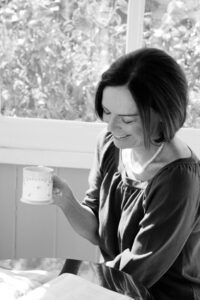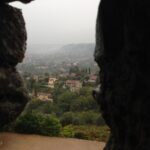Meet Melanie
I grew up on a small farm on the outskirts of Sydney and as a keen horse rider, often competed in local gymkhanas and even broke in a few horses from time to time. As I was surrounded by animals, I decided at an early age to become a nurse, however I couldn’t stand the sight of blood and so opted for a career in teaching. It’s a bit ironic that I married a surgeon.
I read my first Mills & Boon novel when I was 17 and that encouraged me to continue reading romance novels; the lure of the tall dark handsome hero, who in reality I fell in love with and agreed to marry on our second date! We moved to Scotland so my husband could work and study for his MD in surgery. Two lively sons later I decided teaching was the last thing I wanted to do – I knew when I was beaten!
I went back to University and up-graded my teaching diploma to a degree and then went on to do a Masters but still I felt as if something was missing. I sat down one day and began writing and everything clicked into place – I had finally found ‘my brilliant career’! I write from a combination of instinct/pantsing and plotting/ planning. It rather depends on the story idea and the characters. My process has changed from when I first started where I wrote purely on instinct. But even with the best laid plan the characters will still insist on doing things their way! Because I am a keen athlete I find the times I swim really helpful-I find a three kilometre swim will often solve a plot dilemma!
I learnt to swim as an adult and after some great coaching, I went from a non-swimmer to National Top Ten in Master’s Swimming plus several State records. I look on any scary task now in much the same way I did swimming. Yes, I’m scared but I can at least try, rather than say I can’t. I guess you could say that’s my motto-Don’t say I can’t-Say I can try!!
Writing is a skill that can be learned and the best way to learn it is to read and to write. So many people feel they have a novel in them and very probably they are right-the only trick is to get it out. My advice to ‘would be’ writers is to write, write, and write even more. Carry a notebook at all times and jot down ideas. And like any other activity the more you do, the more it feels comfortable.
I hope you enjoy my stories and look forward to hearing from you.
A Day in the Life
A glimpse into the glamorous life of best selling author, Melanie Milburne.
What do you love most about being a writer?
I love the process of writing. I love exploring characters and their emotions. I love the sense of achievement when I’ve typed The End. And of course I love hearing from my readers! It is so humbling to be told your book/s have touched someone deeply.
If you could have your time over what would you do differently?
I would have started writing earlier. I talked about writing a book for years without ever doing it. I’m so glad I eventually sat down and believed in myself enough to do it. It horrifies me that I could have so easily missed out on the joys of being a published author.
What are three words that best describe you?
Enthusiastic, passionate and energetic.
What advice would you give aspiring writers?
Everyone says it: read, read and read. I think that’s terribly important but what is even more important is to write. It is in the process of putting words on a page that you learn how storytelling works. You can’t read it in a book or learn it in a workshop quite the same way as doing it for yourself, finding your voice, developing your unique way of saying what you want to say. I read thousands of books over the years but it was only by sitting down and writing that I found my voice and style.
You write for both Harlequin Presents/Modern and the Medical romance line. Is it difficult moving between the two?
My voice is the same so I don’t find it difficult at all. I have the same amount of sensuality, and while the heroes in a medical might not be quite as alpha as in a Presents/Modern, mine usually are.
Do you ever suffer from writer’s block and how do you overcome it?
I can honestly say I never experienced writer’s block until I hit a wall after my elderly father passed away. I was extremely close to him and took care of him for 14 years before he died. I had heard writing colleagues and friends talk of being stalled, unable to write for days or weeks or even longer but until that point I had not experienced it. It took me two years to work through it and while I still met my deadlines, I was struggling. But what I learned through that time and other times since is that my subconscious will stop me moving forward on a novel if there is a problem with the story, or a character has stopped revealing themselves to me, or if a scene is in the wrong point of view. I also can recognise when I’m feeling burned out, not usually from writing but from what is going on in my life. It’s important for writers to take care of themselves, to protect their creativity by getting plenty of thinking time. I love unblocking my mind with walks in nature, listening to the sound of the sea or the bush. The other thing I’ve learned is writer’s block is something that will eventually pass, but only if you silence your inner critic- most writers have one or several!
How long does it take to write a book?
I’m a fast writer so usually it takes me four to six weeks. I like to have the framework of the story there and then I can deepen the emotional intensity and conflict. It helps to have some distance from it and then go back with new eyes to see how I can make it better.
What do you do when you are not writing?
I read and watch movies, have coffee and people watch. I have regular massage, which helps me to relax. I envy serene, chilled out people. I haven’t got an off switch. My mind is revved like a Ferrari. I’m always thinking of the next story I want to write. I drive myself nuts!
What is your writing routine?
I find it hard to write straight off the block. I have to get other things tidied up first or I can’t get in the zone. I do all the business stuff first thing, and then I go for my walk or my swim before I sit in front of my computer. It is usually late morning or just after lunch and I work until it’s time to do something about dinner. I have numerous cups of tea and the odd biscuit to keep me going!
Are you a plotter/outliner or a wing- it, see how it goes type of writer?
I used to think I was a wing-it writer but lately I’ve realized I do both. Some books seem to write themselves, but I think it’s because I’ve done a lot of subconscious processing before I sat down to write them. There is no right way to do it. I think each writer has his or her own process. I switch between both processes now depending on the book and the amount of time I’ve had to indulge in thinking time.









